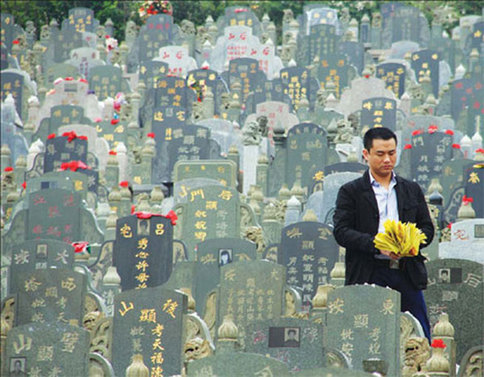Society
Virtual memorial
Updated: 2011-04-01 11:06
By Liu Lu (China Daily European Weekly)
 |
|
Hundreds of millions of Chinese will visit cemeteries this weekend in the lead-up to Qingming Festival. Yuan He / For China Daily |
High-Tech touches to traditional tombsweeping festival help environment
Two weeks ahead of the Qingming Festival, 31-year-old Han Dong has already started to build an online memorial hall for his grandfather, whose death five years ago left the whole family in enormous dismay and grief.
In the past, Han used to travel to the suburbs of Taiyuan, his hometown where he had lived for more than 30 years, to sweep his grandfather's tomb on each Qingming Festival, which falls on April 5 this year.
But after he was transferred to work in Shanghai early this year, it became too expensive and tiring for the Shanxi native to make a special pilgrimage to the cemetery to pay respects on the day of Qingming.
Although Han cannot make a personal trip to the graveyard, he is not upset and has demonstrated his filial piety in a more low-cost and low-carbon way by setting up a virtual memorial hall in the cyber world.
In recent years, a growing number of people like Han, particularly the young, have started experimenting with a more convenient and green way to pay tribute online to their ancestors during traditional occasions rather than at gravesites. It is a trend that has become especially popular during Qingming Festival and the number of "virtual memorial halls" are increasing year by year.
By just a few mouse clicks, Han delivered a letter of condolence, several soothing songs, presented wine, cigarettes and carnations, and even burnt incense and paper offerings to the virtual tomb of his beloved grandpa. All were just like what he had done in front of the concrete grave.
"Those online cemeteries and memorials offer a place of worship for people who live far away from home or those who are too busy to leave their offices," says Han.
"It helps people stay filial without having to take a trip, most important of all, it is so convenient and easy to manage, just like setting up a blog."
Traditionally, the Qingming Festival, or "Tomb Sweeping Day", is a special day that Chinese set aside every year to pay tribute to national martyrs and honor their deceased ancestors at gravesites. The major custom on this day is to clear the tombs and make offerings to the dead.
People remove any underbrush and uproot weeds near the gravesites, wipe the tombstones and decorate them with fresh flowers. And then they will set out offerings of food, burn joss sticks, paper money or other paper offerings. It is a rite that has been observed by the Chinese for more than 2,500 years.
With the emergence of the online memorial in recent years, some environmentally-conscious Chinese are catching on the new trend by taking it as an opportunity to encourage others to incorporate the idea of low-carbon practices into traditional holidays.
"More people are turning to online memorial services to avoid a waste of social and natural resources, and such green concepts prevail in many European countries, where setting up online gravestones are very popular," says Wang Guorong, a researcher of information technology with the Shanghai Academy of Social Sciences. In early March, he launched Shanghai's first memorial website called "Eternal Home".
As China's first memorial website adopting 3D technology, Chen says his website is dedicated to offering Web surfers a more lifelike and user-friendly online mourning platform.
"The increasing number of online tombs is an outcome of the wide application of Internet in China, and also reflects people's keen interest to perform traditions in more environmentally-friendly ways.
"For those who can't make the pilgrimage, online tomb sweeping has relieved their burden of travelling and offers them a green and economical alternative to the traditional paper burning."
Wang says he put forward the initiative as an answer to the green call by local authorities, which for years has encouraged local residents to sweep tombs in a more eco-friendly way.
"The virtual burning of incense does not pose the same challenge to the environment as in the real world."
Wang estimates that there are 450 million Internet users in China and if only one ten thousandth resort to the online tomb sweeping platform, it was still a considerable number.
Plenty of paper sacrifices can be avoided being burned which in the long run will contribute to improving Shanghai's environment by cutting the emission of pollutants.
According to Wang, "Eternal Home" has also reached an agreement earlier this year with China Mobile, one of China's largest telecommunication providers, to launch China's first SMS memorial service platform.
With the help of the service, cell phone users can also send their memorial words to a specified number to show their respects to the deceased.
Many public cemeteries across the nation are also riding the green wave to promote the new way of taking memorial activities.
Beijing became the pioneer of this green campaign.
The Beijing funeral supervision department has built a unified online platform for the 17 cemeteries in Beijing in 2004, which offers mourners free online memorial services for seven years.
"People seemed reluctant to accept this new memorial method in the initial couple of years, but in the past two or three years, our users have increased significantly," says Huang Qiaoquan, director of the policy research office at the Beijing funeral supervision department.
According to Huang, more than 40,000 people have registered to use the service in 2010 and the number is expected to set a new record this year, as the bureau is going to beautify and diversify their on-line services in a bid to attract more users.
Huang says more than 1 million tomb sweepers will flock to Beijing's cemeteries on Qingming Festival this year causing severe traffic jams near gravesites. But as more people begin to pay homage to important historical figures or their ancestors on Internet, traffic conditions on that day will be greatly improved.
But some environmental activists are concerned about the difficulties of promoting this eco-friendly memorial in China's less developed regions.
"I found urban residents are more likely to accept the novel e-memorial, but it may take a longer time for rural residents to adopt it since the traditional folk customs are too deep-rooted in their minds to change," says Li Xinhua, organizer and director of the Green Environmental Alliance based in Ji'nan of East China's Shandong province, which is a non-governmental organization committing to environmental improvement.
"I look forward to governments at various levels to strengthen their efforts in China's vast rural areas with the introduction of relevant regulations to reduce or curb the sacrificial ritual of burning paper offerings so as to better protect our environment."
He adds the government should also propose other environment-friendly mourning activities, such as offering flowers, writing letters or planting more trees.
"A low-carbon Tomb Sweeping Day cannot be realized without the supports and actions of each mourner," Li says.
Specials

In the swim
Out of every 10 swimsuits in the world, seven are made in China.

Big spenders
Travelers spend more on shopping than food, hotels, other expenses

Rise in super rich
Rising property prices and a fast-growing economy have been the key drivers.